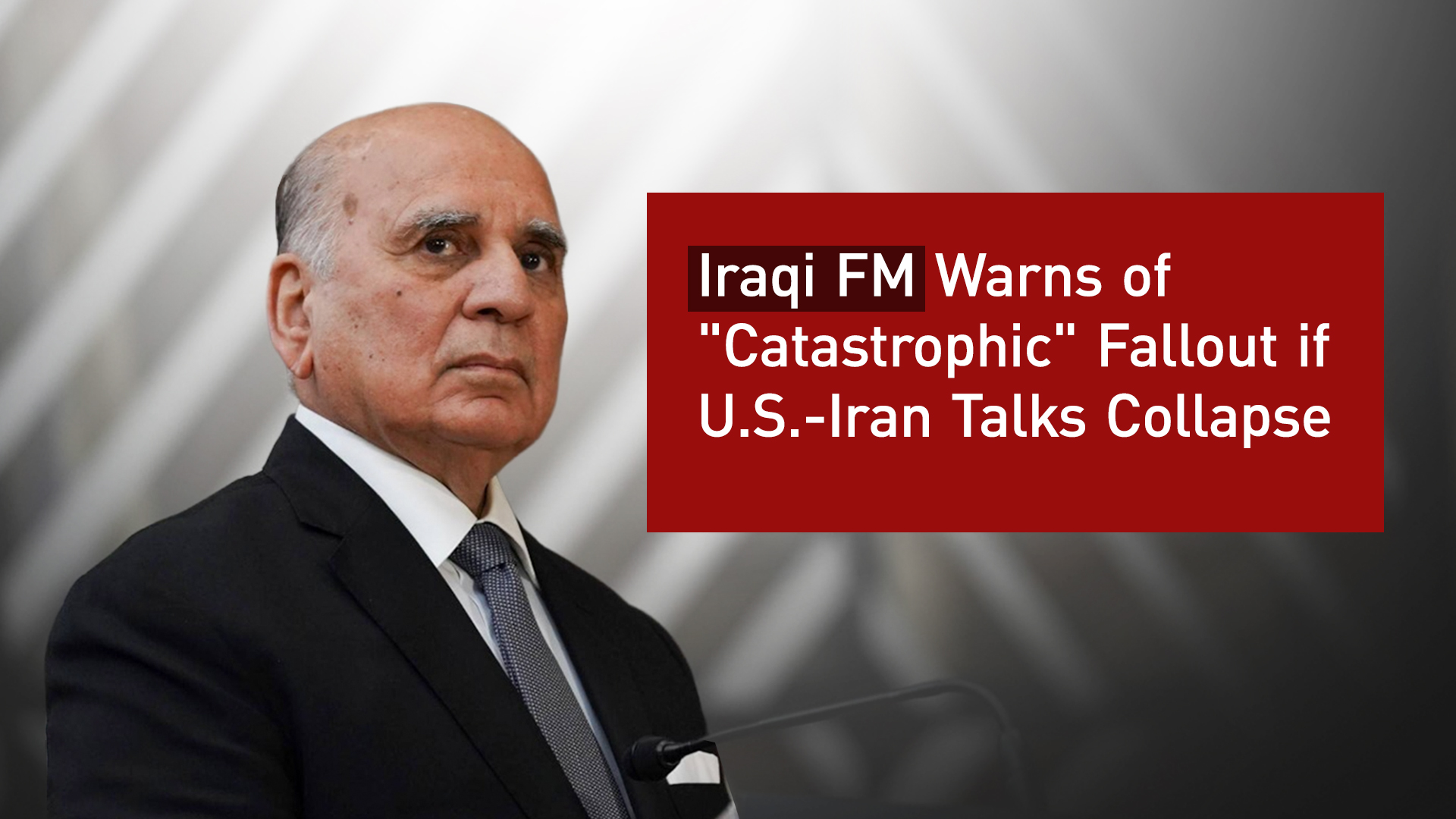Iraqi FM Warns of "Catastrophic" Fallout if U.S.-Iran Talks Collapse
Minister Hussein emphasized Iraq's strong support for the current diplomatic track between Washington and Tehran. “We hope that understandings will be reached and that positive outcomes will emerge to serve regional stability,” he said.

By Kamaran Aziz
ERBIL (Kurdistan24) — Iraqi Foreign Minister Fuad Hussein has issued a stark warning about the regional consequences should ongoing negotiations between the United States and Iran fail, calling such a scenario "catastrophic" for Middle Eastern stability. His remarks came during an exclusive interview with Asharq News, conducted by Hiba Nasr, following Minister Hussein's high-profile visit to Washington.
During the interview, Minister Hussein emphasized Iraq's strong support for the current diplomatic track between Washington and Tehran. “We hope that understandings will be reached and that positive outcomes will emerge to serve regional stability,” he said. However, he cautioned that abandoning diplomacy would unleash dire consequences, impacting not only Iraq but the broader Middle East.
Minister Hussein also reassured that any eventual agreement between the U.S. and Iran "would not come at the expense of other parties in the region," a clear nod to the concerns of neighboring states wary of secret bilateral deals.
The United States and Iran, currently engaged in talks mediated by Oman over Tehran's nuclear program, have already held three rounds of discussions, with a fourth round scheduled for next Saturday.
The warning came after Foreign Minister Hussein held extensive talks with U.S. Secretary of State Marco Rubio on April 25, 2025, at the State Department. According to the readouts released by both the U.S. State Department and Iraq’s Foreign Ministry, the two top diplomats discussed strengthening political, security, and economic cooperation.
Secretary Rubio praised Iraq's efforts to promote regional de-escalation and dialogue, underscoring Baghdad's role as a stabilizing actor amid volatile regional dynamics. Both sides affirmed their shared commitment to Iraqi sovereignty and the importance of combating terrorism, particularly ongoing operations against ISIS remnants.
Economic collaboration featured prominently in their talks. Secretary Rubio commended Iraq for hosting the first-ever U.S. Department of Commerce-designated trade mission in Baghdad earlier this month, which resulted in agreements worth billions of dollars with U.S. companies. Minister Hussein stressed Iraq's initiatives to diversify its energy sources and reduce dependence on imported Iranian gas, calling on American firms to invest in Iraq's strategic sectors.
Minister Hussein also urged a reevaluation of U.S. travel warnings to Iraq, arguing that improved security conditions warrant a reassessment to encourage greater American private sector investment. He noted that several European countries had already adjusted their security advisories in light of improved conditions on the ground.
The two ministers discussed plans to convene a new meeting of the High Committee for bilateral cooperation in June or July, aiming to strengthen ties across multiple fields under the 2008 Strategic Framework Agreement.
Regional issues, particularly the conflict in Syria, also featured heavily during the meeting with the U.S. Secretary of State.
Minister Hussein highlighted the urgency of initiating a comprehensive political process that respects the rights of all Syrian communities and enhances regional stability. Both parties emphasized the necessity of addressing the presence of foreign fighters and the risks posed by prisons controlled by the Syrian Democratic Forces (SDF), where some 10,000 dangerous ISIS detainees are held.
The Iraqi Foreign Minister further noted the importance of lifting sanctions on Syria to alleviate the humanitarian crisis, asserting that stability in Syria is directly linked to Iraq’s own security. "We care deeply about the situation in Syria because what happens there affects us both negatively and positively," he emphasized.
Additionally, Minister Hussein dismissed the notion of an Arab summit taking place during U.S. President Donald Trump's upcoming regional tour, scheduled for May 13-16, which includes visits to Saudi Arabia, Qatar, and the United Arab Emirates.
Despite the regional turbulence, Minister Hussein reaffirmed Baghdad's commitment to a policy of balanced engagement, stressing the importance of maintaining robust communication channels with Washington. "We have succeeded in keeping our country away from the fires of regional wars, and we are working to continue this balanced policy," he concluded.
The foreign minister's diplomatic tour underscores Iraq's ongoing efforts to position itself as a bridge between rival powers while safeguarding its own fragile stability amid intensifying regional tensions.